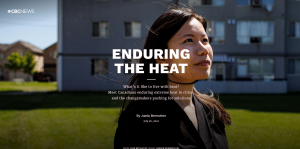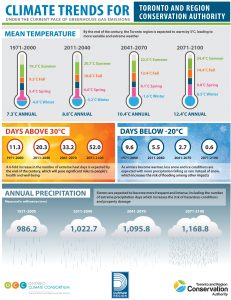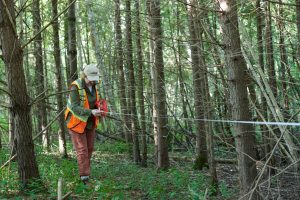How TRCA is taking action on Climate Change
August 17, 2022
Important read! This @CBCNews article ‘Enduring the Heat’ shares snapshots of Canadian residents living in hot apartments, and introduces changemakers pushing for solutions.
Sharon Lam (Project Manager, Ecosystem and Climate Science) shares her own experiences growing up with heat and how planting trees and improving access to parks and river valleys can help residents keep cool and combat climate change.
Here at TRCA, we recognize the urgency of acting on climate change because it impacts everything we do. The more heat-trapping greenhouse gases we pump into the air, the more the planet heats up, and the more devastating its impacts on people, the environment, and the economy, which are always felt locally.
This is why our work has taken on renewed urgency and meaning – the wetlands and streams that we restore, the urban forests that we protect, the conservation parks that we manage all contribute towards reducing greenhouse gas emissions and building a healthier and more resilient region for all.
From planning and policy, to research, education, and implementation, your work is helping to advance knowledge and action on climate change with our partners and the importance of nature-based solutions.
For example, TRCA’s Ecosystem and Climate Science team analyzes and applies complex climate data to understand what the future climate may look like.

These climate projections help us and our municipal partners understand the potential impacts of climate change and inform decisions such as the way we plan and build communities and infrastructure. Learn More
In addition, there are many research initiatives and on-the-ground projects TRCA is involved with that are helping to both mitigate emissions and help our communities adapt to the effects of climate change.
For example, in partnership with the University of Toronto, TRCA is using thermal imaging to research how well regional forest patches, including restored areas, cool the landscape. Learn more
We are also working with our municipalities to inventory and assess the functional value of urban forests.

Recently we contributed to the development of five urban forest best practices guides that will support Peel Region in building a healthier and more climate-resilient community. Learn more
At the neighbourhood level, TRCA’s Sustainable Neighbourhood Action Program (SNAP) is working to help municipal partners and residents retrofit buildings to improve energy efficiency, and build community resilience through greening, infrastructure investments, and programming.
In late November, TRCA will be hosting a free virtual event on the connections between climate change, health, and equity in the Greater Toronto Area with an exciting panel discussion. The purpose of this special event is to identify the actions needed – research, policy, grassroots, or otherwise – to address health inequities exacerbated by climate change in Greater Toronto Area communities. Registration will be open soon.
There are many more ways your work is contributing towards tackling climate change. From the scale of watersheds that cut across municipal boundaries, to local neighbourhoods and sites, we are working to demonstrate the value of protecting nature, transform the way we build communities and infrastructure, connect people with nature, test new energy and water solutions, and train the next generation of environmental stewards.
_____________________________________________________________________
Please contact Noah Gaetz to learn more about what climate-related research the Ecosystem and Climate Science team is undertaking to combat climate change.
You can also visit the Scientific Knowledge Sharing Platform to read the latest scientific publications and webinars related to climate change and building green infrastructure.
You can also explore the Watershed and Ecosystems Reporting Hub to learn more about how climate conditions are changing over time, and where we are relative to where we want to be.